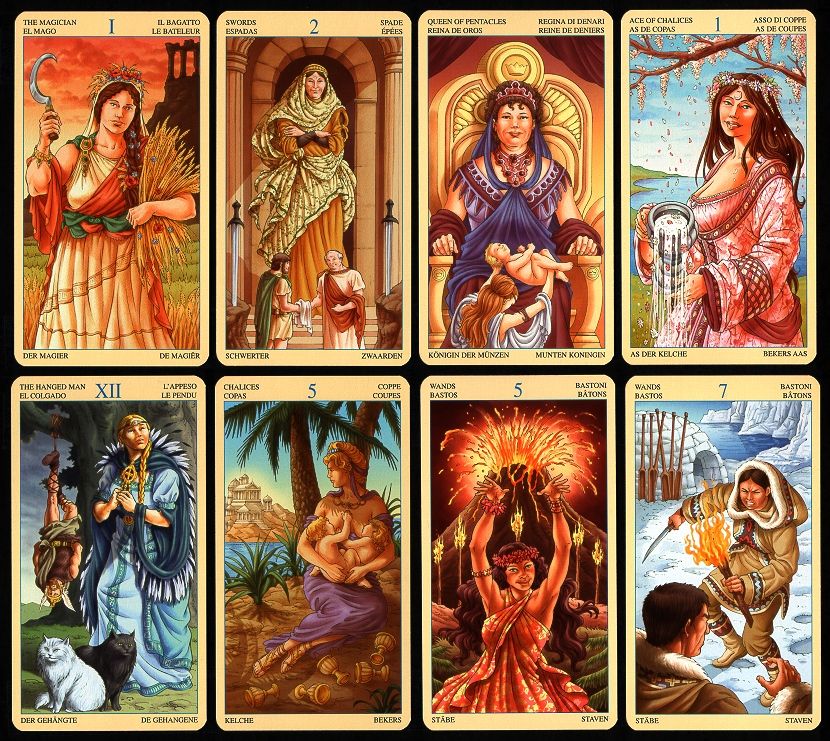The intersection of spirituality and divination practices has long captured human imagination, weaving tales and perceptions that span myriad cultures. The Goddess Tarot, in particular, epitomizes this confluence, drawing profound insights from the myriad goddesses across traditions. While the tarot itself is often perceived through New Age approaches and eclectic spiritualities, there exists a Christian perspective that can illuminate the meanings and implications of these archetypal figures.
At first glance, the use of a tarot deck might raise eyebrows among traditional Christians. The tarot’s historical associations with occult practices often clash with Christian doctrine. Yet, within the framework of the Goddess Tarot, there lies a rich tapestry of female archetypes that can resonate with Christian themes, virtues, and godly wisdom.
Christianity venerates sacred femininity through figures such as the Virgin Mary, saints, and even the biblical wisdom literature that personifies wisdom as a woman. By examining the meanings of various goddesses depicted in the tarot through this lens, one can uncover not just fascinating parallels but also significant truths about the divine feminine and its place within a Christian worldview.
The Divine Feminine: An Integral Component
In Christianity, the concept of the divine feminine is notably embodied in the Virgin Mary, who symbolizes purity, motherhood, and compassion. The Goddess Tarot reflects similar characteristics through figures like Artemis, representing independence and protection, or Demeter, who embodies nurturing and fertility. These goddesses showcase the multifaceted nature of femininity, aligning closely with Christian values.
Interestingly, the embodiment of qualities such as love, wisdom, and strength amongst these goddesses signifies an essential aspect of theology: the belief that all humans—regardless of gender—are created in the image of God. The female archetypes revered in the tarot can serve as conduits for understanding God’s nature, showcasing attributes that are often essential yet frequently understated in predominately patriarchal religious narratives.
Addressing Common Trepidations
Many Christians may initially view tarot cards, particularly a deck centered around goddesses, with skepticism. This apprehension often stems from the association of tarot with the occult, considered contrary to Christian teachings. However, a deeper examination reveals that tarot can serve not merely as a tool for divination but instead as a medium for reflection and exploration of one’s faith journey.
The Goddess Tarot prompts individuals to contemplate their spiritual path, offering archetypes that represent challenges and virtues relevant to daily living. In doing so, these cards engage users in a dialogue with their inner selves, encouraging a view that is introspective rather than predictive. This reframing aligns with Christian values that advocate for self-awareness, ethical living, and spiritual growth.
Symbolism and Spirituality
Delving deeper into the symbolism encapsulated within the Goddess Tarot reveals unexpected connections to biblical narratives. For instance, the archetype of Persephone, who navigates cycles of life and death, poignantly echoes the Christian themes of resurrection and hope. This cyclical nature of existence suggests that life is not merely linear but interwoven with spiritual awakening—a notion that resonates deeply in Christian faith.
Additionally, the goddess Isis, known for her wisdom and healing, parallels Christ’s redemptive qualities as the healer of the world. Such connections illustrate how the exploration of goddess imagery can enrich an understanding of scripture, rather than detract from it. By situating these figures alongside biblical ideals, a hybrid spiritual perspective emerges, fostering deeper contemplation regarding faith and existence.
Cultivating Empathy and Empowerment
The Goddess Tarot also acts as a vehicle for community and empowerment, particularly among women. This is a crucial aspect often touched upon in feminist theology, which seeks to reclaim women’s voices in religious contexts. By engaging with the stories and attributes of various goddesses, women find affirmation and empowerment in their own narratives, fostering sisterhood and solidarity that is rooted in shared experiences and divine femininity.
Furthermore, the exploration of these goddesses can aid men in recognizing and embracing the divine feminine within themselves, developing a holistic faith that acknowledges vulnerability alongside strength. This duality of existence strengthens communal bonds as participants navigate their spiritual journeys collectively, regardless of gender.
A Cautionary Perspective
While engaging with the Goddess Tarot can provide substantial insights, it is crucial to maintain discernment. Christians must ensure that their explorations remain grounded in biblical truths, ensuring that curiosity does not stray into realms of syncretism that dilute doctrinal beliefs. A healthy theological inquiry, coupled with a reverence for both femininity and the divine, creates a sacred space for discussions that honor faith traditions.
The Path Ahead
As the world becomes increasingly interconnected, the dialogue surrounding the Goddess Tarot within a Christian context exemplifies the potential for spirituality to evolve. It invites believers to consider how ancient symbols and archetypes may illuminate contemporary spiritual experiences. Integrating the wisdom of various traditions enriches one’s faith, fostering a tapestry that honors both the Christian narrative and the broader spectrum of human experience.
In this exploration, the Goddess Tarot serves not merely as an artifact but as a reflection of the nuances and complexities inherent in spiritual discourse. By embracing this perspective, individuals can cultivate a more profound understanding of their faith, artfully weaving together the sacred feminine with their spiritual identity.







Leave a Comment